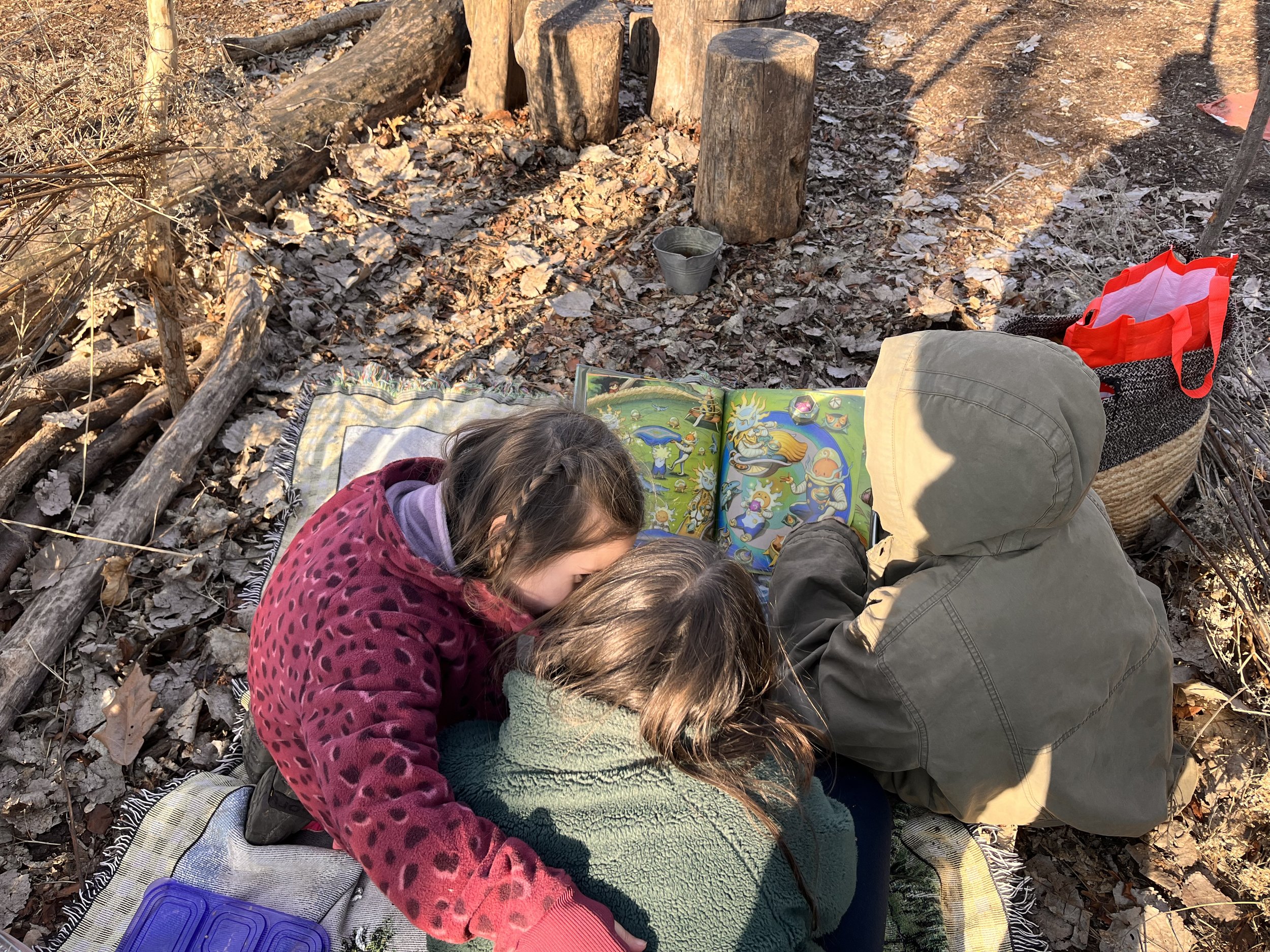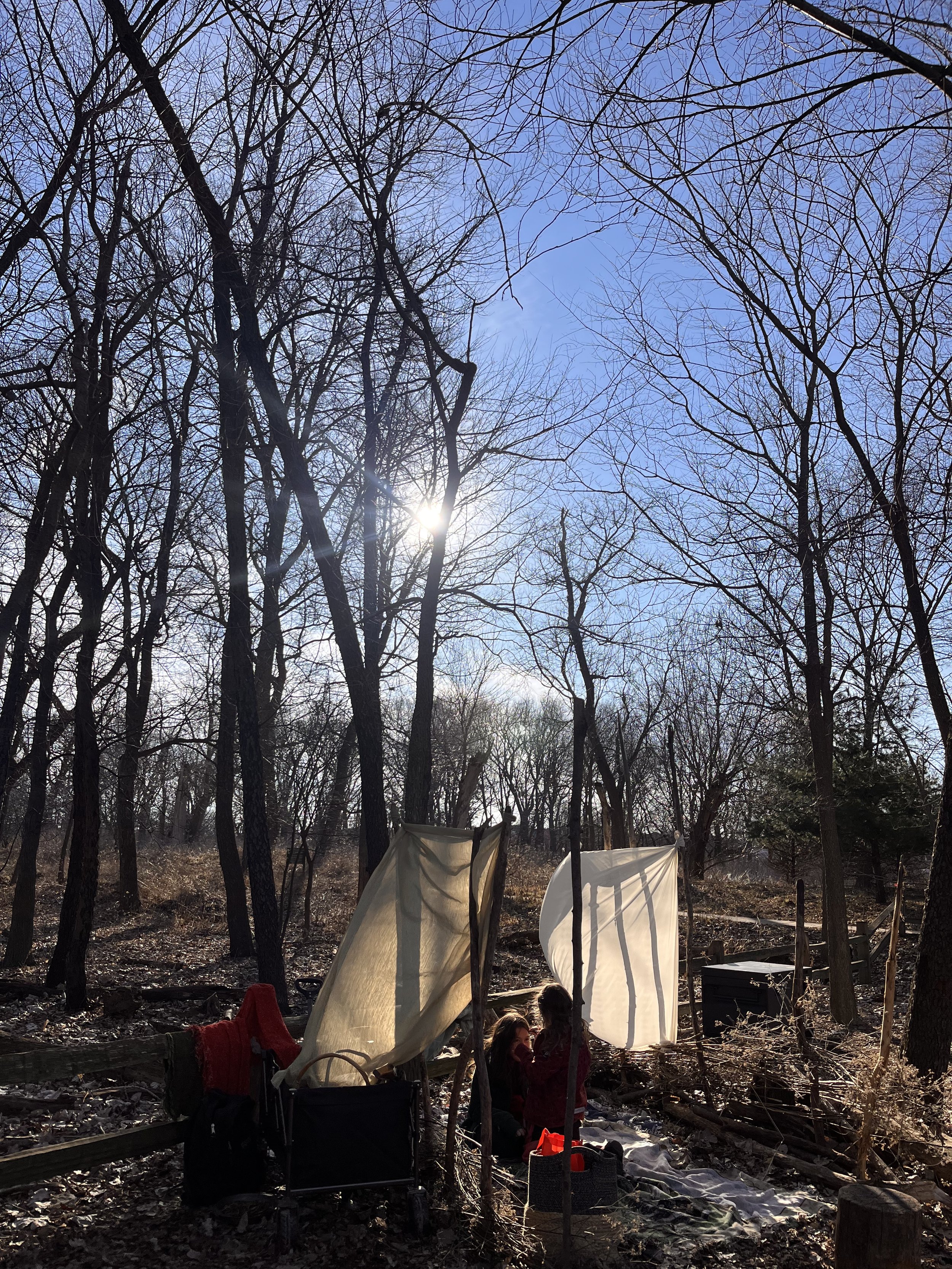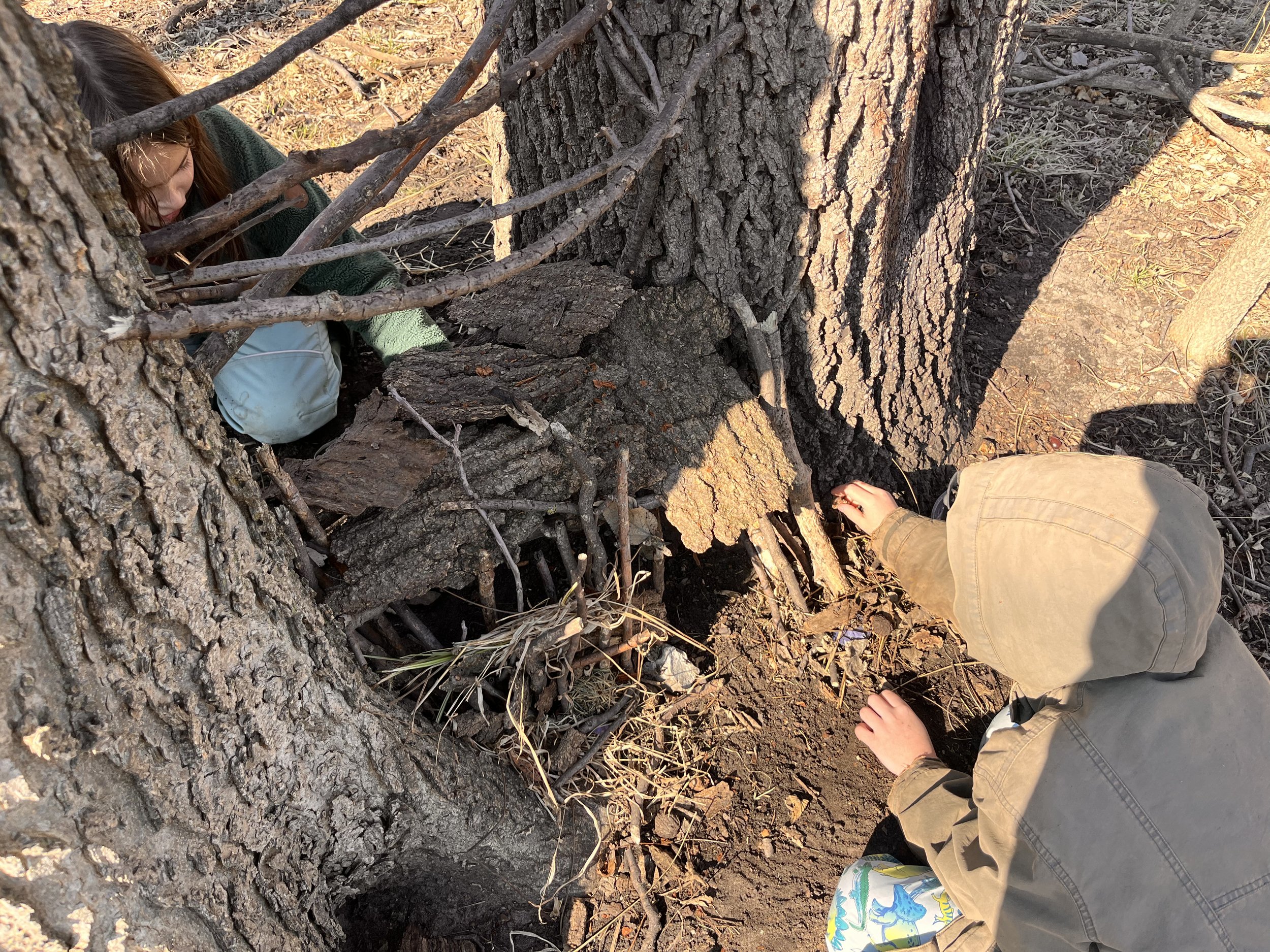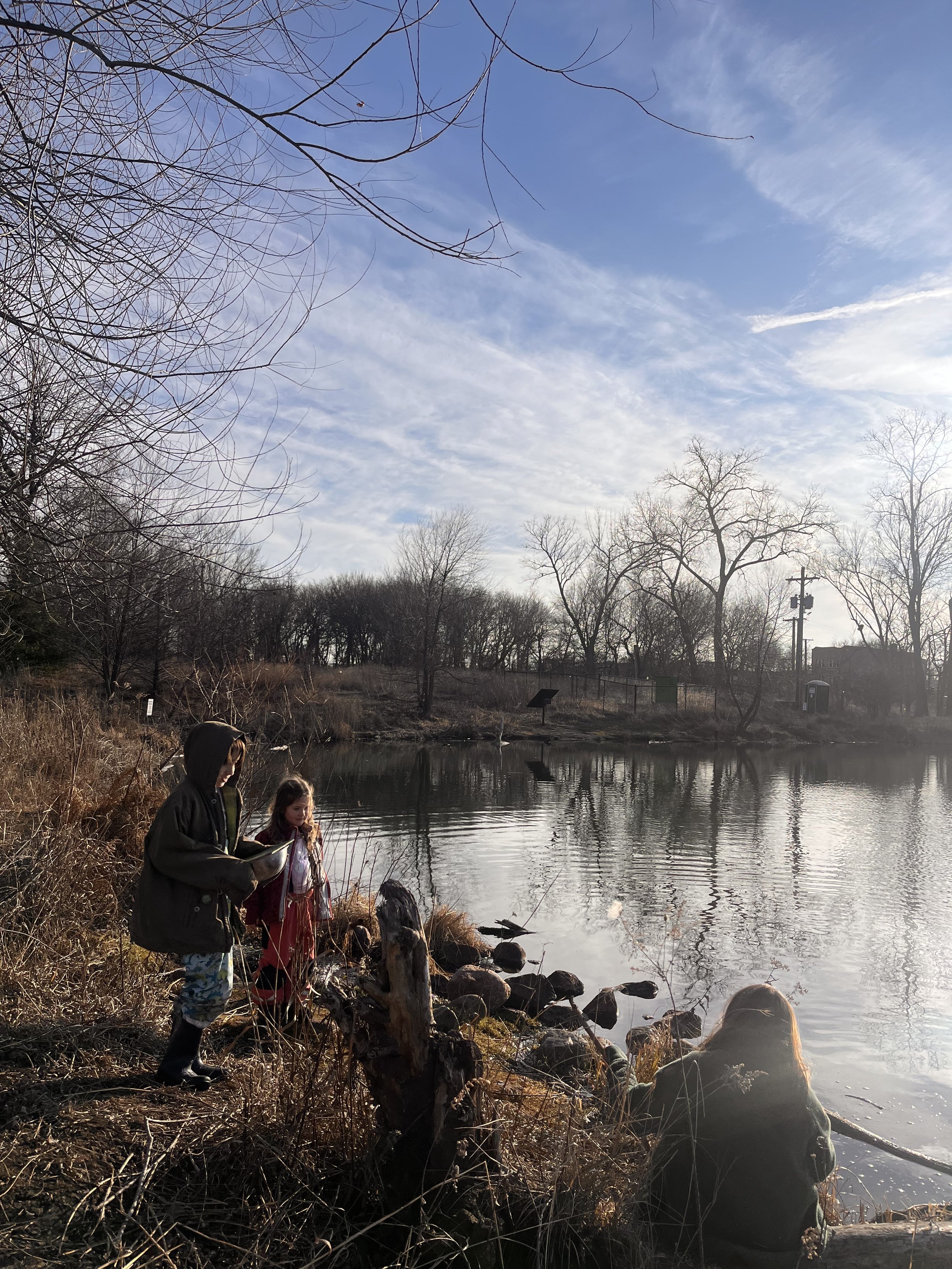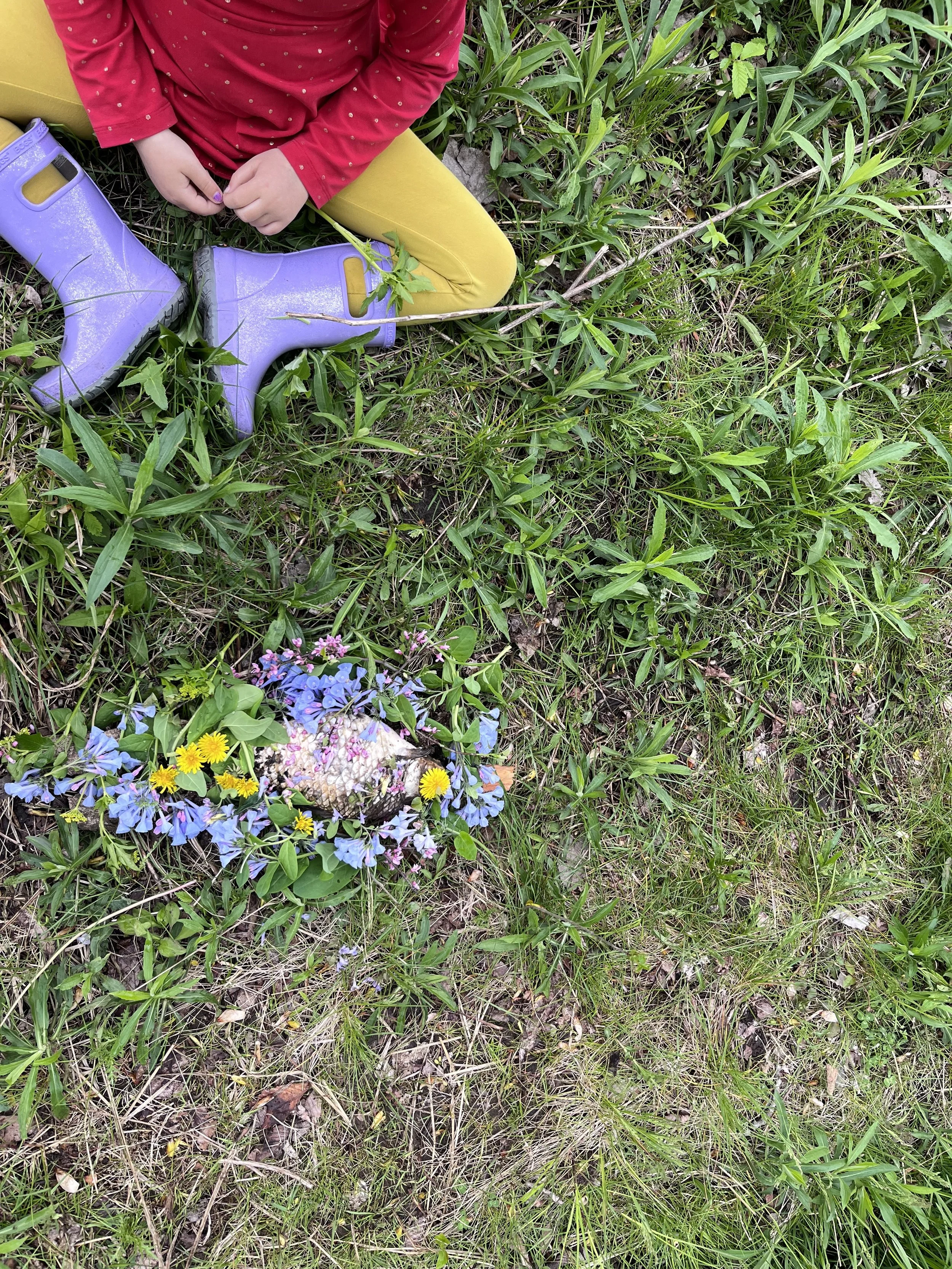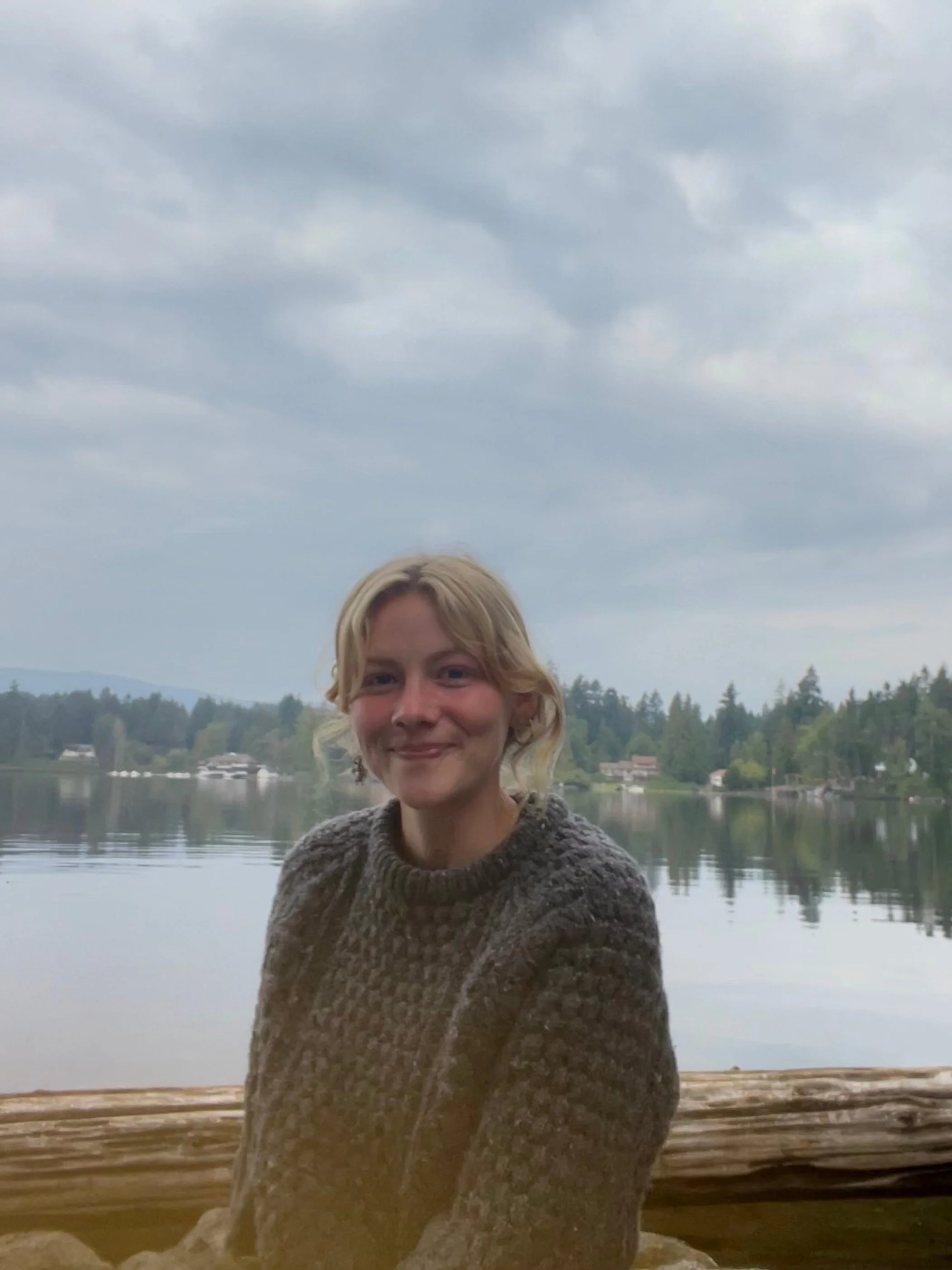About Us
Woodpecker Play (formerly referred to as Northside Nature Play) has existed as a small family-organized outdoor play group since June of 2020. We meet outside year-round in public natural areas of Chicago’s North/Northwest side, moving through the seasons to play and learn in small groups within 2-5 hour sessions. We provide a safe, empowering, and nurturing environment in which children have room to play, build, investigate, imagine, immerse, and explore with a facilitator’s support and guidance. Our play and learning is guided by inquiry and the land where we live and spend our days, building a relationship of familiarity and reciprocity with the woodland, wetland, savannah, prairie and lakefront ecosystems of Chicago. We are influenced by forest school and folk school pedagogies, focusing on place-based, child-directed, inquiry-led and play-based learning. We believe all children are capable and competent learners, and that learning happens most effectively through play and investigation.
Small group sessions maintaining a 1:5 max adult to child ratio are facilitated by Alexia Faulkner and organized by Grainne McKeown, who began organizing the group as a parent looking for an opportunity for her child to be immersed in the forest and to find and hold dear, a love of nature. Together, our mission is to provide an enriching outdoor experience where learners can develop greater resilience and regulation tools, improve communication and social skills, navigate risk safely, participate in community and form a personal connection with our neighborhood ecosystems.
Learn More
-
To create space for children to play is to create space for children to make sense of the world, to work through feelings and explore ideas. As Maria Montessori stated, "play is the work of the child". Free play makes our co-learning process possible as we collaborate and explore, building knowledge and relationships through the play and investigation that the environment invites. Facilitators will prepare thoughtful activities and provide a loose structure for the day, but plans may flow and change to suit the needs of the group.
Play-based learning encourages risk-taking, open-ended investigation, problem-solving and experimenting. It leads us to imaginative thinking, and to questions that promote curiosity and wonder. It calls for us to step into different roles, to consider new stories and perspectives.
We can engage the senses and the body and hold space for all the emotions that play can create. While play can often be a delightful & joyful experience, it can also be a way for children to work through frustrations or investigate complex issues. The space for unstructured play can lead us to boredom too, which although uncomfortable, offers pause to reflect, regulate, and create mental availability for new ideas.
Facilitators may act as play participants throughout the day, offering guidance or redirection when appropriate, but also must know when to step back, observe, assess, and give space for play to happen freely.
-
Having an outdoor program means that relationship with land is at the center of what we do. To have a sense of place centered in our programming means that we recognize the stories that have shaped this place, especially the ones forgotten and forcibly erased, the here and now of our experience on this land, and how our presence here can impact the future.
As we spend time on City of Chicago park land, we are in the unceded homelands of the Council of the Three Fires: the Ojibwe, Odawa, and Potawatomi Nations, as well as many other tribes that also call this area home. Our land acknowledgement is ever-evolving as we explore how to effectively honor a commitment to truth-telling, understanding our impact, and celebrating anti-colonial resilience.
We love the land through knowing it, becoming familiar with the ecosystems where we spend time. We are learning to be good stewards of the land and members of our community, practicing reciprocity in our relationships and learning how to best hold space for ourselves and others.
Our daily learning is centered around the changes that happen at our meeting site through the seasons and throughout each day. In spring, we see violets, nettles, bluebells, all the spring ephemerals blooming. We jump in puddles and taste the rising maple sap. We follow insects in the summer, watch Praying Mantises hunt and Monarchs feast on Milkweed. We feel the fullness of summer fall away, we examine the death and decay of the fall. We observe how animals adapt to survive the winter. We go where the seasons take us, and use all of our senses to attune to those rhythms.
-
We aim to eliminate the hierarchy that a teaching role typically creates. Educators are not “experts” but are co-learning and playing, asking questions and exploring ideas collaboratively. The adult’s role is to observe and assess closely, provide activities and materials that inspire engagement, build community, and “set the stage” for meaningful and imaginative interactions.
Adults may be play participants, offer guidance, redirect and set boundaries when appropriate, but will also step back to observe, assess and allow children to play freely. Facilitators provide support for children to follow and expand upon their own curiosities, creating a safe and nurturing environment to play, take appropriate risks, and learn together.
-
Woodpeckers serve as a powerful teacher for our nature play group, embodying the value of woodland density and biodiversity. Their unique foraging habits create nesting cavities that not only benefit themselves but also provide homes for various other species, illustrating the beauty of sharing space. This mirrors the group’s mission to foster an environment that values diversity and explores coexistence in urban environments, where different communities learn to thrive together. By pecking away at trees, woodpeckers aerate the bark and aid in the decomposition of dead wood, enriching the soil and supporting new plant growth—an essential lesson in nurturing our surroundings.
In the context of the nature play group, woodpeckers inspire children and families to explore their urban landscapes and appreciate the intricate connections within ecosystems. They exemplify how we can carve out our own niches while contributing to a vibrant environment. By promoting outdoor play and exploration, the group encourages participants to embrace nature, fostering a shared responsibility for preserving and enhancing the spaces we inhabit. In doing so, we cultivate a community that values the interconnectedness of all living things, just as woodpeckers do in their woodland habitats.
Meet Our Facilitator
Alexia Faulkner
I came to forest school pedagogy through the former Forest Play School in North Park’s Walking Stick Woods, joining as a caregiver with two young children I nannied for during college. At the time, I was 3 years into a BA degree in Advocacy and Social Change at Loyola University Chicago, and experiencing a disconnect between my education and its application to a career or passion. At Forest Play School, I witnessed a culture of learning, new for me, that was playful, democratic, innovative and immersive in the woodland environment of North Park.
After living in Chicago for only a couple years and lacking the sense of place I had in my hometown near Cleveland, it was healing to find this pocket of space to reconnect via grounding sensory experiences and playful learning. Exploring textures of moss and bark and worms, taking the time to regulate and handle feelings or conflict, hearing birds and trying to find them in the trees, playing with shadows, exploring the fascinating history of North Park’s land use — Immersing more intentionally in my environment has lead me to be more explorative, to ask questions about my surroundings, and to strengthen my relationship with myself, the land, and the people I share space with. To “stick my finger in the ground” is to bring me back to my body, to the Chagrin River of my childhood; my small world of mulberry stained feet and sticky white pine treetops. These powerful sensory experiences of outdoor play in childhood are the guiding force of my passion for Forest School.
The learning I knew in school was dictated by testing standards and limiting curriculums, motivated mostly by teacher’s praise and avoidance of punishment. I have learned through forest school the value of learning guided by curiosity and exploration, and I hope with this program to carve more space for learning journeys to move freely in play, guided by immersion in an outdoor space and thoughtful consideration of that environment.
I have a Forest School Practitioner’s Certification (Level 3 Equivalent), as well as over a decade of childcare experience as a nanny. I have been facilitating mixed-age nature play sessions since June of 2020 and have been co-learning with the children all along the way!

“I am not all knowing. Therefore, I will not even attempt to be.
I need to be loved. Therefore, I will be open to loving children.
I want to be more accepting of the child in me. Therefore, I will with wonder and awe allow children to illuminate my world.
I know so little about the complex intricacies of childhood. Therefore, I will allow children to teach me.
I learn my best from and am impacted most by my personal struggles. Therefore, I will join with children in their struggles.
I sometimes need a refuge. Therefore, I will provide a refuge for children.
I like it when I am fully accepted for the person I am. Therefore, I will strive to experience and appreciate the person of the child.
I make mistakes. They are a declaration of the way I am - human and fallible. Therefore, I will be tolerant of the humanness of children.
I react with emotional internalization and expression to my world of reality. Therefore, I will relinquish the grasp I have on reality and try to enter the world as experienced by the child.
It feels good to be an authority, to provide answers. Therefore, I will need to work hard to protect children from me!
I am more fully me when I feel safe. Therefore I will be consistent in my interactions with children.
I am the only person who can live my life. Therefore, I will not attempt to rule a child's life.
I have learned most of what I know from experiencing. Therefore, I will allow children to experience.
The hope I experience and the will to live come from within me. Therefore, I will recognize and confirm the child's will and selfhood.
I cannot make children's hurts and fears and frustrations and disappointments go away. Therefore, I will soften the blow.
I experience fear when I am vulnerable. Therefore, I will with kindness, gentleness, and tenderness touch the inner world of the vulnerable child.”
- Principles for Relationships with Children ― Garry L. Landreth, Play Therapy: The Art of the Relationship










